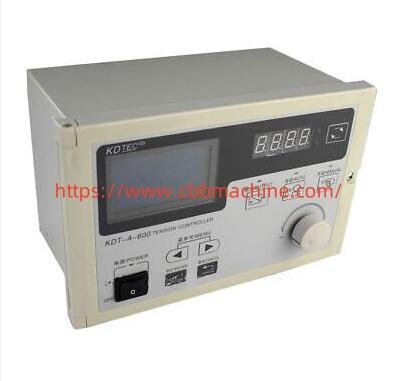In modern manufacturing processes, controlling the tension of materials is crucial for ensuring consistent product quality and smooth operations. The Tension Controller plays a vital role in this process, allowing manufacturers to precisely adjust and maintain the tension on materials as they pass through production lines. This is especially important in industries such as textiles, printing, wire manufacturing, and packaging, where materials need to be fed through machines without distortion or breakage.
The primary function of a tension control system is to monitor and adjust the tension on materials to ensure that they are processed accurately and efficiently. If the tension is too high, the material may stretch or break, resulting in wasted product and downtime. Conversely, if the tension is too low, the material may slip, causing misalignment or production delays. A well-designed system helps maintain the right amount of tension, ensuring smooth processing and preventing issues that could disrupt the production line.
Durability is another key advantage of using a tension control system in industrial settings. Industrial machinery operates continuously and often under high-speed conditions, which places considerable strain on equipment. High-quality systems are built to endure these tough conditions and offer long-lasting performance. By providing consistent tension control throughout the manufacturing process, they help reduce wear on both the material and the machinery, minimizing the need for frequent repairs or replacements.
Moreover, modern systems offer automatic adjustment capabilities, which significantly improve efficiency. These systems are equipped with sensors that detect any variations in the material's characteristics, such as thickness or elasticity. When changes occur, the system automatically adjusts the tension, ensuring that the material remains properly aligned and evenly processed. This real-time feedback and automatic adjustment reduces the need for manual intervention, allowing operators to focus on other tasks and increasing overall productivity.
Safety is a critical concern in industrial environments, and tension control systems contribute to reducing workplace hazards. By ensuring that materials are fed through machines at the correct tension, the likelihood of accidents caused by material slippage or over-tensioning is greatly reduced. Additionally, maintaining the proper tension helps prevent excessive wear on machinery, which can lead to mechanical failures and costly downtime. With the right system in place, manufacturers can protect both their workers and their equipment, resulting in a safer and more reliable production environment.
The versatility of tension control systems is another factor that makes them indispensable across various industries. From the textile industry to automotive manufacturing and packaging, these systems are adaptable to different materials and machines. The ability to integrate tension controllers into various production lines allows manufacturers to streamline operations, reduce equipment complexity, and simplify maintenance. As production demands grow or change, businesses can rely on these systems to adjust without requiring extensive modifications to their existing infrastructure.
In addition, ease of use is a significant advantage of many modern tension control systems. With user-friendly interfaces and simple setup processes, operators can quickly adjust the settings to match the material being processed. This reduces the time spent on training and troubleshooting, further increasing operational efficiency. A well-integrated system can seamlessly become part of the workflow, providing consistent results without requiring constant adjustments.
In conclusion, a tension control system is an essential component for industries that require precise material handling. By ensuring that tension is maintained at the correct level, manufacturers can improve product quality, reduce waste, and enhance safety. These systems contribute to a more efficient and productive manufacturing process, making them a valuable investment for businesses looking to stay competitive in today’s fast-paced industrial world. To learn more about the importance and applications of tension controllers, visit https://www.cbbmachine.com/news/industry-news/tension-controller-types-importance-applications-and-more.html.

